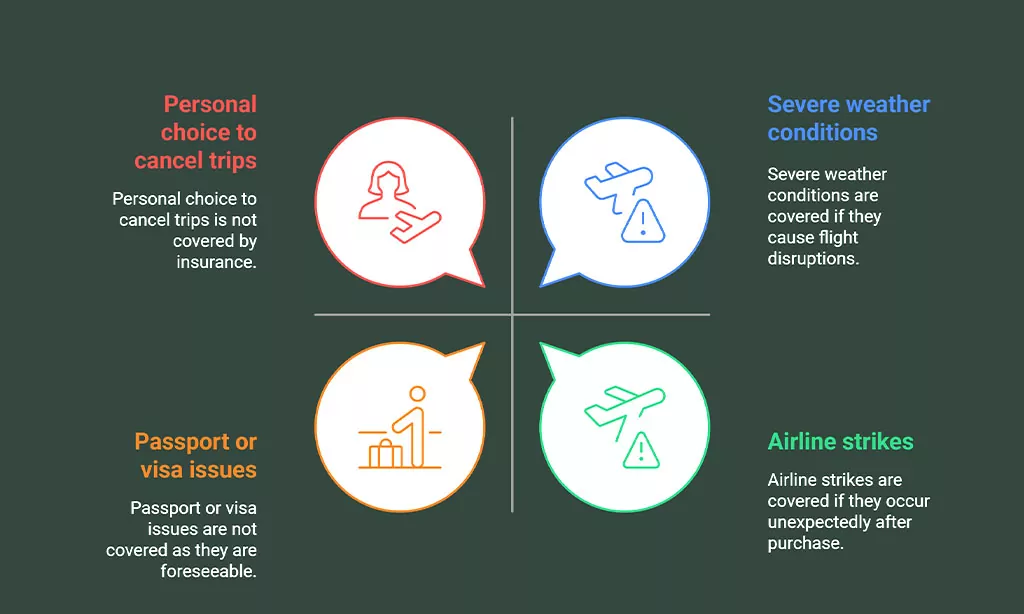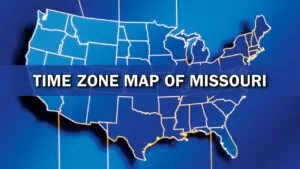Flight changes can throw a wrench in your travel plans. You booked your dream vacation months ago, but now you need to switch your travel dates. A common question pops up: “Will travel insurance cover flight changes?” The stress of dealing with airlines and fees can make anyone’s head spin.
Travel insurance plans often cover flight changes due to specific reasons. These include medical emergencies, severe weather, or job loss. Yet, many travelers don’t know which situations qualify for coverage.
Some plans even cover change fees if you need to switch flights.
This guide breaks down what travel insurance covers for flight changes. We’ll walk through the types of changes covered, how to file claims, and tips for picking the right policy. Ready to learn how to protect your travel plans?
Key Takeaways
- Travel insurance covers flight changes due to specific reasons like medical emergencies, severe weather, job loss, and natural disasters.
- Most policies require claims to be filed within 30 days of changes and need proper documentation like airline letters, medical notes, or weather reports.
- Trip exchange benefits help cover change fees and fare differences, but won’t cover personal choice changes or pre-existing conditions.
- Insurance companies often cover delays lasting six hours or more, paying up to $500 per day for meals and hotels.
- Filing claims with both airlines and insurance companies is allowed, but travelers must report any airline refunds to their insurance provider.
Will Travel Insurance Cover Flight Changes?

Travel insurance can save you money when airlines change your flight plans. Your policy might pay for new tickets, hotel stays, and meals if you face sudden changes that match your policy rules.
Covered Reasons for Flight Changes
Flight changes happen more often than you might think. Your travel insurance can step in to help with many common reasons for changing your flights.
- Severe weather conditions that force flight cancellations or major delays, like hurricanes, blizzards, or floods
- Medical emergencies that prevent you from flying, though pre-existing conditions need special coverage
- Death or serious illness of a family member that requires you to change your travel dates
- Work-related reasons such as job loss or required business meetings, if listed in your policy
- Natural disasters at your home or destination that make travel impossible
- Airline strikes or labor disputes that cause flight cancellations
- Military duty that calls you away from planned travel
- Passport or visa issues beyond your control, like processing delays
- Traffic accidents on the way to catch your flight, with proof from police reports
- Jury duty or court appearances that clash with your flight dates
- Terrorist incidents at your planned destination within 30 days of travel
- Mechanical problems with the aircraft that cause major delays or cancellations
- Airline bankruptcy that leaves you without a flight
- School year changes that affect your travel dates, if your policy includes this
- Hotel or resort closures at your destination due to natural disasters or bankruptcy
Reasons Not Covered by Travel Insurance
Now that you know what travel insurance covers, let’s look at what it won’t cover. Travel insurance has clear limits on coverage, and knowing these can save you from future disappointment.
- Personal choice to cancel trips won’t get coverage from standard travel insurance. Your sudden dislike of the destination or change of plans won’t qualify for reimbursement.
- Pre-existing medical conditions often fall outside coverage unless you buy special add-ons. Most insurers need proof that your condition was stable before buying the policy.
- Bad weather forecasts alone don’t trigger coverage. The weather must actually disrupt your travel plans or cause cancellations by airlines.
- Work-related changes rarely get coverage under basic policies. Your boss asking you to stay or losing your job won’t count unless you have specific job-loss protection.
- Passport or visa issues stay outside most coverage areas. Missing documents or expired passports are your responsibility to fix before travel.
- Overbooking situations by airlines typically don’t qualify. Airlines must handle these cases through their own policies and compensation rules.
- Fear of traveling to certain places won’t trigger insurance benefits. Even if your destination feels unsafe, general anxiety about travel isn’t covered.
- Airline strikes announced before you bought insurance won’t count. Only unexpected labor actions after your purchase date might get coverage.
- Missed flights due to oversleeping or poor planning stay outside coverage limits. You must prove an unavoidable reason for missing your flight.
- Changes made to attend special events or meet friends won’t qualify. Social plans don’t count as valid reasons for coverage under most policies.
Trip Exchange Benefits in Travel Insurance
Trip exchange benefits act as your safety net when flight plans go sideways. You’ll get money back for sudden changes, like if you need to switch your flight because of a family emergency or bad weather.
Definition of Trip Exchange Coverage
Trip exchange coverage acts as a safety net for your travel plans. This part of travel insurance helps you switch your flight dates without losing money. Most comprehensive travel insurance plans offer this benefit alongside trip cancellation and interruption coverage.
You’ll get money back for change fees and fare differences if you need to move your travel dates.
Insurance companies set clear rules about what counts as a valid reason to change flights. Your policy might cover flight changes due to severe weather, medical emergencies, or mechanical issues with the plane.
But you can’t get coverage just because you changed your mind about traveling. The terms and conditions spell out exactly what your travel policy will and won’t pay for. Make sure to read these details before buying insurance.
How to Use Trip Exchange for Flight Changes
Flight changes happen to everyone, and travel insurance can help cover these sudden shifts in plans. Your travel policy might cover flight changes due to covered reasons like severe weather or medical emergencies.
- Contact your insurance carrier right away after learning about needed flight changes. Most companies need you to report changes within 24 hours.
- Get written proof from the airline about your original flight details and the reason for changes. This helps speed up your insurance claim process.
- Save all receipts related to your flight changes, including new tickets and any fees. Insurance companies need these documents to process your claim.
- Fill out the claim forms from your insurance company completely. Missing information can delay your reimbursement for change fees.
- Submit medical documents if health issues caused your flight change. Travel insurance covers changes due to sudden illness or injury.
- Take photos of any weather alerts or news reports if bad weather forced your changes. This backs up your claim for severe weather coverage.
- Keep records of mechanical problems if they caused flight delays. Many policies cover changes due to aircraft technical issues.
- Ask for help from your insurance company’s 24-hour support line. They can guide you through the claim process.
- Check your policy’s time limits for filing claims. Most travel insurance requires claims within 30 days of changes.
- Make sure your new flight dates fall within your policy coverage period. Insurance won’t cover changes outside these dates.
- Request a letter from the airline stating why they changed your flight. This proves the change wasn’t your choice.
Required Documentation for Filing a Claim
Filing a travel insurance claim needs proper paperwork to back up your case. You must submit proof of your original flight booking, along with any receipts for new tickets or change fees.
Your travel insurance company will ask for documents that show why you needed to change your flight. These might include doctor’s notes for medical issues or weather reports for severe storms.
Most insurance providers require you to file your claim within 30 days of the flight change. You’ll need to fill out a claim form with details about your trip dates and what went wrong.
Keep copies of emails from airlines about flight changes or cancellations. Photos of airport departure boards showing delays can help too. The more proof you have, the faster your claim process will go.
Smart travelers take pictures of all travel documents before their trip starts.
Additional Flight-Related Coverage
Your travel insurance plan goes beyond basic flight changes. Travel insurance steps in to protect you from many flight troubles, like delays that keep you stuck at the airport or missed connections that mess up your whole trip.
Delayed Flights
Travel insurance steps in to help during flight delays that last six hours or more. Most comprehensive travel insurance plans offer coverage for meals, hotels, and other basic needs during extended waits.
The policy kicks in once your airline confirms the delay stems from covered reasons like mechanical issues, severe weather, or staffing problems.
Insurance companies need proof of your delay before they pay any claims. Save all receipts from food and lodging expenses during the delay. You’ll also need official documents from the airline that show why and how long your flight was delayed.
Trip interruption benefits through travel insurance often provide better coverage than what airlines offer for delays.
Missed Connections
Missed flight connections can throw a wrench in your travel plans. Most comprehensive travel insurance plans step in to save the day with coverage for these sticky situations. Your policy might pay for extra costs like hotel stays, meals, and new tickets if you miss your connecting flight due to bad weather or mechanical problems.
Insurance companies often require proof that your delay wasn’t your fault, so keep all your flight documents handy.
Filing a claim for missed connections needs quick action. You’ll need to contact both the airline and your insurance company right away to report the issue. Many policies cover up to $500 per day for extra expenses during delays lasting six hours or more.
The best part? Your policy might even cover the cost of catching up with a cruise or tour if you miss it because of flight troubles. Next up, let’s explore what you should think about before picking a travel insurance plan.
Canceled Flights
Travel insurance offers solid protection against canceled flights through comprehensive coverage plans. Most policies pay back your pre-paid travel costs if your airline cancels your flight for covered reasons.
Bad weather, mechanical problems, or medical emergencies often qualify for reimbursement. Your policy might cover the full cost of your ticket, plus extra expenses like hotel stays or new flight bookings.
Filing a claim for a canceled flight needs proper proof from your airline. You must show documents that confirm your flight’s cancellation and the reason behind it. Smart travelers keep their boarding passes, receipts, and any emails from the airline about the cancellation.
Many insurance companies like Allianz make this process easier with online claim forms. Next, let’s explore key factors to think about while picking travel insurance that fits your needs.
Key Considerations for Choosing Travel Insurance

Smart travelers pick travel insurance that mixes trip cancellation with trip exchange benefits to get the most coverage – read on to learn the best ways to protect your next adventure.
Combining Trip Cancellation and Trip Exchange
Trip cancellation and trip exchange work together to give you better protection for your travel plans. Most comprehensive travel insurance plans offer both benefits, which cover different situations that could affect your flights.
Trip cancellation pays back your pre-paid expenses if you can’t take your trip for covered reasons. Trip exchange helps you change your travel dates without losing money.
Your travel policy needs both types of coverage to handle various flight problems. Medical emergencies, severe weather, and mechanical issues can force you to cancel or change flights.
The right mix of coverage lets you file claims for either canceling your trip completely or just switching your dates. Make sure to read the terms and conditions carefully – some policies won’t cover changes related to pre-existing medical conditions.
Filing a Claim with the Airline vs. Travel Insurance
After understanding your coverage options, you’ll need to know the right way to file claims. Airlines and travel insurance companies handle claims differently. Most airlines offer basic coverage for flight changes due to mechanical issues or severe weather.
They might give you a refund or help with rebooking flights without extra fees. Yet, their coverage stays limited to just the flight costs.
Travel insurance offers broader protection than airlines do. A good travel policy covers more than just flight changes – it includes trip cancellation, medical expenses, and lost luggage.
Filing an insurance claim needs proper papers like booking details and proof of the issue that caused your change. The best part? You can file claims with both the airline and your insurance company at the same time.
Just make sure to tell your insurance about any money you got back from the airline. Allianz and other top insurers make the claim process simple through online forms or mobile apps.
Takeaways
Travel insurance can protect you from many flight change headaches. Smart travelers know that good coverage saves both money and stress during unexpected changes. Your policy needs careful review before purchase to match your specific travel needs.
Most plans cover common issues like weather delays, medical problems, and work emergencies. Pick the right travel insurance plan today to fly with peace of mind tomorrow.
FAQs
1. Does travel insurance cover flight changes due to bad weather?
Yes, most travel insurance policies cover flight changes caused by severe weather. Your policy may pay for change fees and help with rebooking flights if storms mess up your travel dates.
2. What happens if I miss my connecting flight?
Travel insurance typically covers missed connections due to delays from mechanical issues or other covered reasons. You’ll need to file a travel insurance claim to get money back for new tickets.
3. Will my credit card’s travel protection cover flight changes?
Credit card travel protection is often more limited than comprehensive travel insurance. It may only cover economy class tickets and have strict terms and conditions.
4. Can I change my flight for any reason with travel insurance?
Only Cancel For Any Reason (CFAR) coverage lets you change flights without a specific covered reason. Regular trip cancellation insurance needs a valid reason listed in your policy.
5. What won’t travel insurance cover for flight changes?
Most policies won’t cover changes due to work schedule conflicts or simple preference. Check your policy exclusions carefully, as terms of use vary between each insurance agency.





























